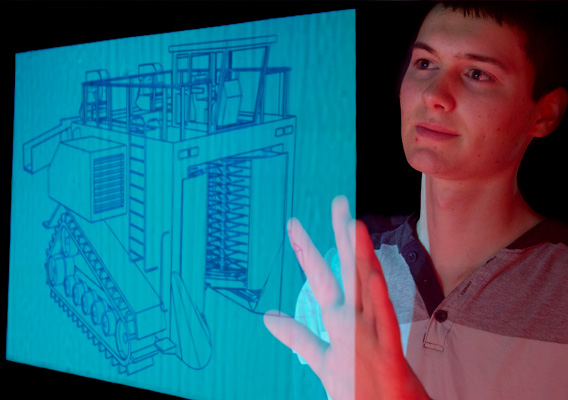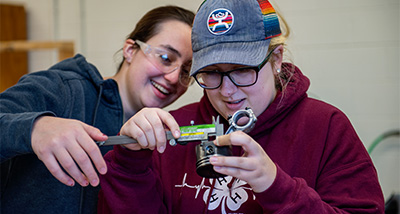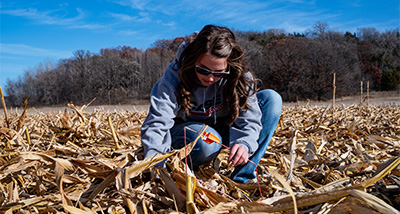
Why Study Agricultural Education?
Graduate | Education/Agriculture | CAFES
UWRF's Agricultural Education graduate degree program provides options for both educators seeking professional development and degree holders looking to enter the field. Our Professional Development in Agricultural Education option is designed for educators in both classroom and non-formal settings to continue their professional development, while our Initial Teaching Licensure option is designed for students with a non-teaching baccalaureate degree who are seeking their initial teacher licensure in agricultural education.
Who is this program designed for?
-
Certified agricultural educators in middle, secondary or post-secondary schools
-
Agriculture, food or environmental science professionals in extension, industry or other non-formal education settings who want to earn a graduate degree
-
Those seeking initial certification as agricultural education instructors in middle or secondary schools
Program Details
- Completed application for graduate study at UWRF with application processing fee.
- An earned baccalaureate degree from an accredited institution.
- Official transcripts from all institutions attended as an undergraduate student, sent directly to the Admissions Office from the institution.
- An overall undergraduate grade point average of at least 2.75 (on a four-point scale) or an average of at least 2.90 based on the last 60 semester credits (90 quarter credits) of the undergraduate program.
- Flexibility to construct a graduate program that meets the needs of different students.
- A history of excellent job placement rates and starting salaries among graduates.
- A connection between theory and practice in the dynamic fields of agriculture, food and environmental science.
- Integration of distance learning and face-to-face classroom course work.
Professional Development in Agricultural Education
Degree Requirements
Professional Education, 7 credits
TED 740 History, Philosophy and Multicultural Education, 4 credits
TED 750 Advanced Educational Psychology, 3 credits
or TED 760 Methods of Research, 3 credits
Specialization, 20-21 credits
AGED 781 Graduate Seminar, 1 credit
AGED 782 Research Seminar I, 1 credit
AGED 783 Research Seminar II, 1 credit
AGED 798 Independent Research, 1-3 credits
or AGED 799 Thesis, 2-3 credits
Specialization Electives, 9-14 credits
AGED electives, 3-6 credits
Selected upon consultation with advisor
Non-Specialization, 3 credits
Elective courses from outside the departments and selected for either professional education or specialization.
Initial Teaching Licensure
Degree Requirements
Undergraduate Licensure Requirements, 15 credits or more
TED 440 Techniques in Agriculture., 3 credits
Choose one student teaching option, 12 credits
TED 472 Student Teaching - Initial
TED 473 Student Teaching -Additional License
TED 474 Student Teaching - COST International
TED 479 K-12 Internship Teaching
Any classes needed to meet WI Department of Public Instruction requirements for agricultural education content and general education.
Licensure Requirements, 30 credits
AGED 569 Philosophy of Vocational and Cooperative Education, 4 credits
AGED 603 Supervision of Work Experience and Youth Organizations, 3 credits
AGED 630 Methods of Teaching Ag Mechanics, 3 credits
AGED 662 Curriculum Design in Vocational Education, 3 credits
AGED 701 Advanced Leadership and Group Dynamics, 2 credits
ESM 500 Environmental Education, 3 credits
SPED 530 Exceptional Child, 3 credits
TED 622 Secondary School & Content Area Reading, 3 credits
TED 701 Psychology of Teaching and Learning, 3 credits
TED 706 Historical, Philosophical, and Multicultural Foundations of Education, 3 credits
Research Requirements, 4-6 credits
AGED 781 Graduate Seminar, 1 credit
AGED 782 Research Seminar I, 1 credit
AGED 783 Research Seminar II, 1 credit
Choose from:
AGED 777 Capstone Experience, 1-3 credits
or AGED 793 Final Research Paper, 1-3 credits
or AGED 799 Thesis, 1-3 credits
Additional licensure requirements include a portfolio, demonstration of basic skills, demonstration of academic progress, demonstration of subject matter, and 2,000 hours of work experience in occupations related to agriculture, food or natural resources.
Agricultural Education
james.graham@uwrf.edu // 715-425-3555
Your Degree:
Graduate
Area of Study:
Education/Agriculture

Skills and Learning Outcomes
- Develop educational programs based on state and national curriculum standards.
- Demonstrate proficiency in best practices and how to implement them.
- Utilize instructional technology to support learning.
- Efficiently work with learners from a range of backgrounds, abilities and interests.
- Implement experiential, service and work-based learning programs.
Types of Courses
- Curriculum Design in Vocational Education
- Environmental Education
- History, Philosophy and Multicultural Education
- K-12 Internship Teaching
- Methods of Teaching Ag Mechanics
- Psychology of Teaching and Learning
- Supervision of Work Experience and Youth Organizations
- Techniques in Agriculture




